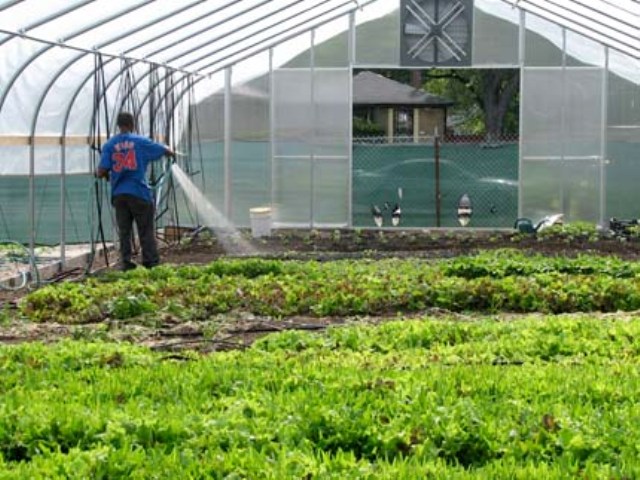Urban Gardens That Lower Crime Rates Taking Root In Englewood, North Lawndale
By Kim Bellware in News on Jul 27, 2012 9:15PM

Growing Home's Wood Street urban farm in Englewood. (Chuck Sudo/Chicagoist)
It's been a violent summer in Chicago, with growing homicide numbers over the past few months grabbing front-page headlines in our city and beyond.
But there's a sprout of good news, courtesy of the ever-thoughtful (and The Interrupters producer) Alex Kotlowitz writing for this month's issue of Mother Jones (accompanied by some stunning photos by Emily Schiffer).
In his story, "Plant Tomatoes. Harvest Lower Crime Rates," Kotlowitz highlights the Growing Home community gardens in Englewood for their contributions to increased neighbor-to-neighbor contact—and hopefully, decreased levels of crime and violence.
Kotlowitz notes that while the urban farms are adding healthy produce to an area often cited as a food one of the city's food deserts—13,000 pounds of vegetables a year are harvested from the half acre plot, with some of the bounty used at RTW Veterans Center on the South Side to provide free organic meals to neighbors—the more nourishing effect the gardens have had is what he calls a "reclamation of sorts." That, according to Kotlowitz, involves "taking ownership of [the Englewood neighbors'] community and their daily lives."
The strongest example Kotlowitz cites is a community block in Philadelphia that saw a steady decrease in crime over a decade's time as more community gardens popped up in vacant lots. Shootings went down as gardening involvement went up, a trend Kotlowitz suggests is tied to neighbors getting to know their neighbors, and becoming emboldened to call the police for nuisances and more serious crimes that once went unreported.
In Chicago, Kotlowitz tells of a principal from the Community Christian Alternative Academy in North Lawndale who built a garden to help curb violence. The garden's effect? More people positively congregating for lunch or just communing outdoors. As for Growing Home's gardens in Englewood, a few of the gardeners profiled—former convicts and those whose records make them largely ineligible for your traditional 9-5—speak of the pride they have from gardening. They also mention another thing that's grown from working the soil: peace.